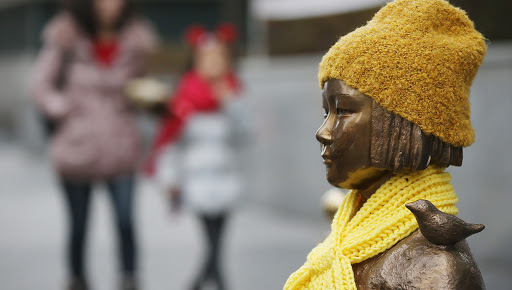Harvard professor invites fury by calling ‘comfort women’ prostitutes
Author previously received Japan’s Order of the Rising Sun; critics question ties with Mitsubishi as endowed professor
By Ahn Sung-miPublished : Feb. 3, 2021 - 17:51

A journal article written by a Harvard professor has provoked fury here for its assertion that “comfort women” were not sex slaves, but prostitutes who chose to work at military brothels under voluntary agreements.
In the paper, titled “Contracting for sex in the Pacific War” and published in the International Review of Law and Economics, Mark Ramseyer, Mitsubishi professor of Japanese legal studies at Harvard Law School, argued that Korean comfort women -- as they often euphemistically labeled -- were part of Japan’s licensed prostitution system at the time.
His arguments contradict the testimonies of survivors, who say they were either coerced or tricked into sex slavery, and the work of scholars who support their movement. Scholars estimate that between 170,000 and 200,000 women and girls were forced to work in Japan’s military brothels before and during World War II, and the UN acknowledges that this occurred.
Ramseyer said, “I’ll let the article speak for itself” when reached by The Korea Herald for comment, adding that “this is a question about scholarship.” He declined to address the controversy surrounding his article.
“They chose prostitution over those alternative opportunities because they believed prostitution offered them a better outcome,” Ramseyer said in his paper, stating that the women were aware of the health risks and other dangers involved in working at the brothels and made their decision based on the economic opportunities.
This process was “contractual,” he said, and followed the logic of game theory. The women understood the harsh nature of prostitution and the damage it would mean to their reputations, so as a trade-off recruiters promised the women high wages and upfront payment.
Addressing the case of Korean victims specifically, his paper denied that they were forcibly mobilized by the Japanese government and also denied the Japanese military’s involvement with fraudulent recruiters, putting the blame on Korean recruiters and saying they deceived the women.
“The problem involved domestic Korean recruiters who had been tricking young women into working at brothels for decades,” Ramseyer said.
His arguments have been met with strong condemnation from scholars here, after the conservative Japanese media outlet Sankei Shimbun reported on his paper.
Yuji Hosaka, a political science professor at Sejong University, condemned Ramseyer’s arguments as flawed for mentioning only certain documents as evidence, and questioned his intentions in publishing the article at this time when tension over the issue runs high between the two countries.
Hosaka explained that the documents that Ramseyer used in his article do not tell the full story, including the 1938 regulation by the Home Ministry on recruiting women for the overseas comfort stations.
“The 1938 document stipulates that the Japanese government only grant approval to women who were already in the prostitution industry and who voluntarily applied to go overseas to military brothels. But in reality, that wasn’t the case on the ground,” Hosaka told The Korea Herald. “There is other evidence that proves the military was part of faking the identification of these women to send them to the overseas war front, and other documents in 1940 and 1942 that back the enforced nature of the recruitment.”
Hosaka claims that the professor, who had his upbringing in Japan, could have ties to right-wing nationalist groups in the country.
“With the latest court ruling that favored the comfort women victims, these right-wing groups felt the pressure to voice their position on the international stage,” he said. “It’s concerning that his paper could be used by nationalists to prove their faulty position.”
Seo Kyung-duk, a professor at Sungshin Women’s University and a prominent figure in promoting Korea and its history, slammed the article on Facebook and questioned the author’s association with Mitsubishi as an endowed professor.
Japan’s Mitsubishi Heavy Industries is at the center of a diplomatic feud between Tokyo and Seoul for its use of forced laborers from Korea during Japan’s 1910-1945 occupation of the Korean Peninsula.
In 2018, the South Korean Supreme Court ordered Mitsubishi to pay Korean victims of forced labor. The Japanese firm and the Japanese government have ignored the ruling, and the court has moved to liquidate local assets seized from Mitsubishi to compensate victims.
Ramseyer also received the Order of the Rising Sun, Gold Rays with Neck Ribbon, the third-highest class of an honor with seven classes, from the Japanese government for his contributions to Japanese studies in the US.
By Ahn Sung-mi (sahn@heraldcorp.com)









![[Today’s K-pop] BTS pop-up event to come to Seoul](http://res.heraldm.com/phpwas/restmb_idxmake.php?idx=644&simg=/content/image/2024/04/17/20240417050734_0.jpg&u=)

![[Graphic News] More Koreans say they plan long-distance trips this year](http://res.heraldm.com/phpwas/restmb_idxmake.php?idx=644&simg=/content/image/2024/04/17/20240417050828_0.gif&u=)






![[KH Explains] Hyundai's full hybrid edge to pay off amid slow transition to pure EVs](http://res.heraldm.com/phpwas/restmb_idxmake.php?idx=652&simg=/content/image/2024/04/18/20240418050645_0.jpg&u=20240419100350)

